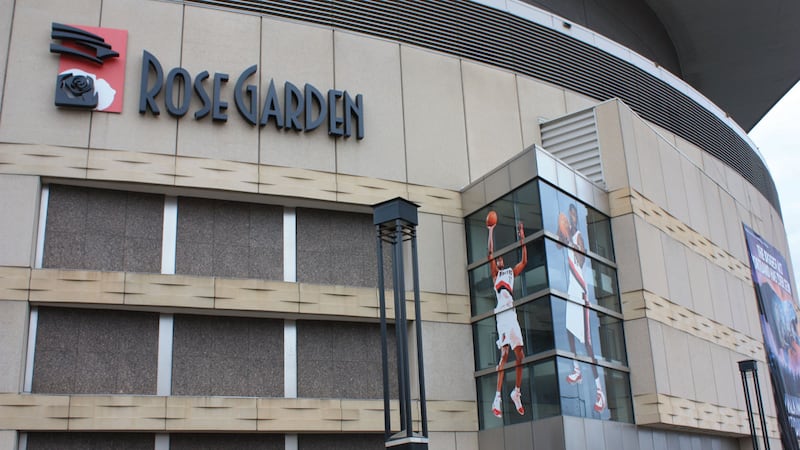I missed the most notorious season in Trail Blazer history by a week.
It was the season when Damon Stoudamire's yellow H2 would be pulled over near Chehalis, Wash., and busted for marijuana possession. Rasheed Wallace would try to fight crooked referee Tim Donaghy on the Rose Garden's loading dock. Zach Randolph would break Ruben Patterson's eye socket with a sucker punch during practice, then spend the next few days in hiding.
I was a security guard for the Jail Blazers era at its peak—but then I got busted for swearing.

It took me only a few minutes after being hired at the Rose Garden to meet my ultimate Blazer hero. To my horror, I wasn't wearing any pants.
It was Steve Jones, the Snapper himself, sauntering out from a behind a pillar in the parking garage. He was whistling, flipping a key fob. Jones played only a year for Portland, but he was an icon in broadcasting. More importantly to me, he was the most famous graduate of my alma mater, Franklin High School.
"You're Steve Jones," I stammered, apologizing for my trouserless state, explaining that I was changing clothes because I was going swimming in the Gorge.
"Carry on, young man," he said, never breaking stride. Then he got into a very expensive car and drove away.
I guess I'm a Trail Blazer now, I thought, feeling, in some minor way, knighted into an organization I'd revered since I was small. With that new sense of self-worth, I pulled up my swim trunks.

On Orientation Day, there were three new hires. All of us were Oregon National Guardsmen. The other two guys were fresh out of basic. I was 22 years old, recently back from Bosnia.
We had been hired to provide security for the Rose Quarter, which stretched from Northeast Broadway to Multnomah Street. The property included the Memorial Coliseum, parking garages, team offices and the Rose Garden itself.
We weren't officially on duty on game days or for events; on those occasions, security was outsourced. The rest of the time, we patrolled the Rose Quarter on foot.
I liked the arena most when it was quiet. There's an odd comfort in great, empty buildings. Our most curious task was escorting visitors to the hidden penthouse directly above the Rose Garden floor. The suite could only be reached past a locked elevator and gated catwalk, which was as far as I ever got. The rumor was that Paul Allen's mother lived inside.

In mid-October, the Blazers' 2002 season began.
There was, like most years, some optimism. Only two seasons removed from their Western Conference Finals meltdown, the roster remained deep: 'Sheed, Scottie Pippen, and Damon Stoudamire were the core. Rookie Zach Randolph had showed promise the previous year. Paul Allen was willing to spend. General Manager Bob Whitsitt was ready to deal.
The security gate was next to the loading dock, where players parked. Younger stars (Stoudamire, Bonzi Wells) preferred H2s. Older stars (Scottie Pippen, Sheed) drove original Hummers. Role players like Dale Davis and Derek Anderson arrived in more standard SUVs. Arvydas Sabonis drove a Mercedes sedan. Richie Frahm, a Battle Ground, Wash., native who was cut in preseason, was always the first to arrive, in a lowly, used Land Rover.
The majority of the players were surly. I didn't expect chitchat from pro athletes, but the team's coldness was a surprise. Peons were utterly ignored. The exceptions were Sabonis, who might offer a mumble and nod, and Stoudamire, who often smiled and said hello to people he passed.
One day, I was stationed at the loading dock gate, which was blocked by a chain-link fence on rollers. It would be my job to let players in. There was one major caveat:
"As soon as you see a red Hummer, you get that gate open. Fast," the supervisor said.
"Why?" I asked.
"That's Scottie. If the gate isn't open, he won't stop."
This sounded strange and I laughed.
"I'm serious," he said. "They don't wanna fix it again."

Whatever disappointment I felt in gaining a backstage look at my heroes was probably mirrored in the disappointment the Rose Garden felt toward me. Used to the camaraderie of Army radio chatter, I was written up twice for profanity over the arena's radio channel.
Ninety days after my hiring, I was stationed at an old metal desk in the front concourse of the Coliseum. That was a good post because one could read. Rain sheeted down the tall glass window panes. My supervisor arrived with a knock. My 90-day trial period was over, she informed me. They'd decided not to keep me on.
I turned in my badge at the end of the shift. It was the first time I'd been fired, and by one of the institutions I loved most.
The Blazers did get one good employee out of that batch. One of the other two hires was a guy named Justin Eyerly, who impressed the security staff and was promoted to the Blazers' marketing division. A year and a half later, he was killed in an ambush near Sadr City in Iraq. The Blazers established a scholarship at Portland State University in Eyerly's name.
Justin was a good man. That scholarship more than made up for firing me.

